法律文本翻译
- 格式:ppt
- 大小:192.00 KB
- 文档页数:29


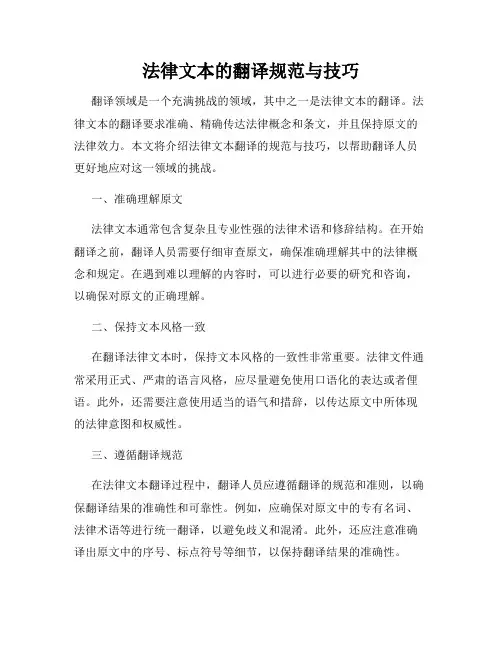
法律文本的翻译规范与技巧翻译领域是一个充满挑战的领域,其中之一是法律文本的翻译。
法律文本的翻译要求准确、精确传达法律概念和条文,并且保持原文的法律效力。
本文将介绍法律文本翻译的规范与技巧,以帮助翻译人员更好地应对这一领域的挑战。
一、准确理解原文法律文本通常包含复杂且专业性强的法律术语和修辞结构。
在开始翻译之前,翻译人员需要仔细审查原文,确保准确理解其中的法律概念和规定。
在遇到难以理解的内容时,可以进行必要的研究和咨询,以确保对原文的正确理解。
二、保持文本风格一致在翻译法律文本时,保持文本风格的一致性非常重要。
法律文件通常采用正式、严肃的语言风格,应尽量避免使用口语化的表达或者俚语。
此外,还需要注意使用适当的语气和措辞,以传达原文中所体现的法律意图和权威性。
三、遵循翻译规范在法律文本翻译过程中,翻译人员应遵循翻译的规范和准则,以确保翻译结果的准确性和可靠性。
例如,应确保对原文中的专有名词、法律术语等进行统一翻译,以避免歧义和混淆。
此外,还应注意准确译出原文中的序号、标点符号等细节,以保持翻译结果的准确性。
四、注重目标语言的特点和规范法律文本翻译需要注重目标语言的特点和规范。
不同语言有其独特的法律表达方式和习惯用语,翻译人员应该熟悉目标语言的法律术语和翻译惯例,以确保翻译结果的准确性和专业性。
同时,也需要注意避免直译和模仿原文的表达方式,而应根据目标语言的习惯表达法律概念和规定。
五、用词精准,语句通顺在法律文本翻译中,用词的准确性是非常重要的。
翻译人员应选用准确、具有法律意义的词汇,以确保翻译结果的精确传达法律概念和条文。
同时,还需要注意语句的通顺和流畅性,以确保翻译结果的易读性和可理解性。
六、修订和校对在完成法律文本翻译后,翻译人员应进行修订和校对工作,以确保翻译结果的准确性和一致性。
修订和校对过程中,可以借助专业的辅助工具和法律文献,对翻译结果进行比对和检查,以确保没有漏译、错译等问题。
总结:法律文本的翻译是一项需要准确性、专业性和严谨性的工作,同时也是一项具有挑战性的任务。
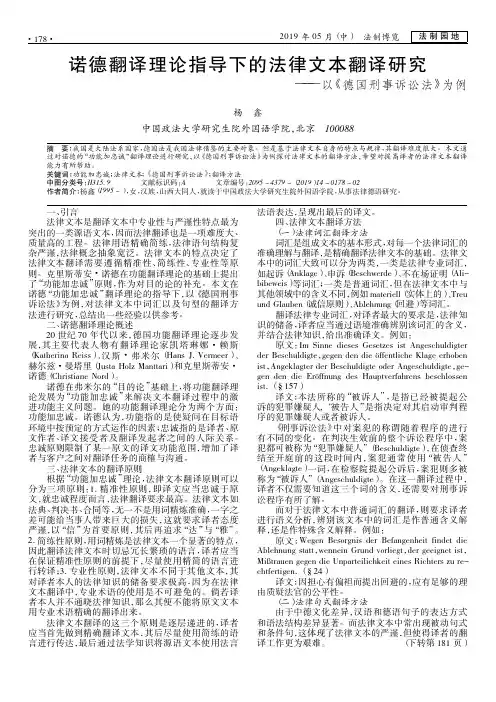
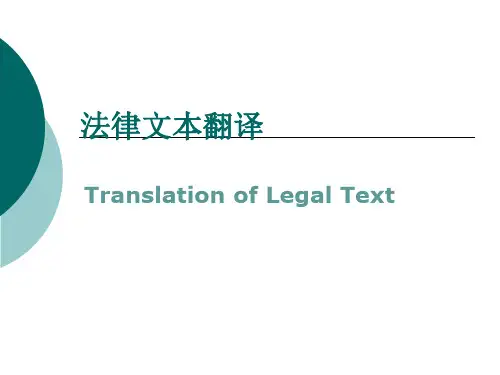

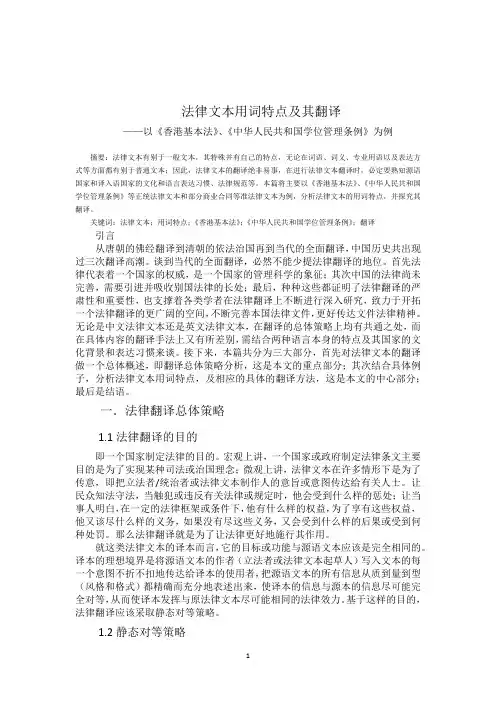
法律文本用词特点及其翻译——以《香港基本法》、《中华人民共和国学位管理条例》为例摘要:法律文本有别于一般文本,其特殊并有自己的特点,无论在词语、词义、专业用语以及表达方式等方面都有别于普通文本;因此,法律文本的翻译绝非易事,在进行法律文本翻译时,必定要熟知源语国家和译入语国家的文化和语言表达习惯、法律规范等。
本篇将主要以《香港基本法》、《中华人民共和国学位管理条例》等正统法律文本和部分商业合同等准法律文本为例,分析法律文本的用词特点,并探究其翻译。
关键词:法律文本;用词特点;《香港基本法》;《中华人民共和国学位管理条例》;翻译引言从唐朝的佛经翻译到清朝的依法治国再到当代的全面翻译,中国历史共出现过三次翻译高潮。
谈到当代的全面翻译,必然不能少提法律翻译的地位。
首先法律代表着一个国家的权威,是一个国家的管理科学的象征;其次中国的法律尚未完善,需要引进并吸收别国法律的长处;最后,种种这些都证明了法律翻译的严肃性和重要性,也支撑着各类学者在法律翻译上不断进行深入研究,致力于开拓一个法律翻译的更广阔的空间,不断完善本国法律文件,更好传达文件法律精神。
无论是中文法律文本还是英文法律文本,在翻译的总体策略上均有共通之处,而在具体内容的翻译手法上又有所差别,需结合两种语言本身的特点及其国家的文化背景和表达习惯来谈。
接下来,本篇共分为三大部分,首先对法律文本的翻译做一个总体概述,即翻译总体策略分析,这是本文的重点部分;其次结合具体例子,分析法律文本用词特点,及相应的具体的翻译方法,这是本文的中心部分;最后是结语。
一.法律翻译总体策略1.1法律翻译的目的即一个国家制定法律的目的。
宏观上讲,一个国家或政府制定法律条文主要目的是为了实现某种司法或治国理念;微观上讲,法律文本在许多情形下是为了传意,即把立法者/统治者或法律文本制作人的意旨或意图传达给有关人士。
让民众知法守法,当触犯或违反有关法律或规定时,他会受到什么样的惩处;让当事人明白,在一定的法律框架或条件下,他有什么样的权益,为了享有这些权益,他又该尽什么样的义务,如果没有尽这些义务,又会受到什么样的后果或受到何种处罚。

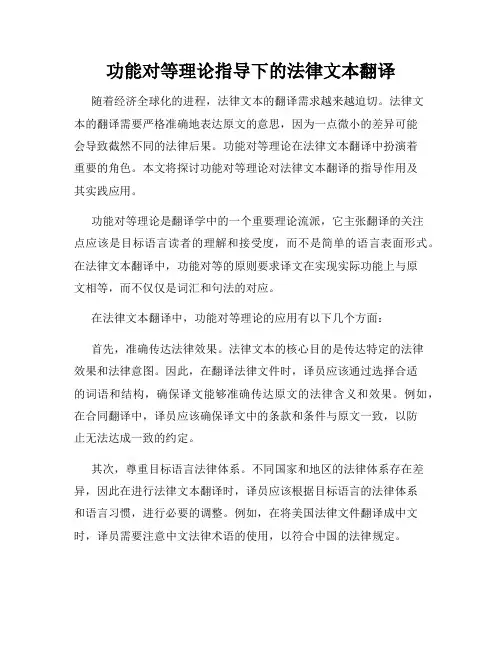
功能对等理论指导下的法律文本翻译随着经济全球化的进程,法律文本的翻译需求越来越迫切。
法律文本的翻译需要严格准确地表达原文的意思,因为一点微小的差异可能会导致截然不同的法律后果。
功能对等理论在法律文本翻译中扮演着重要的角色。
本文将探讨功能对等理论对法律文本翻译的指导作用及其实践应用。
功能对等理论是翻译学中的一个重要理论流派,它主张翻译的关注点应该是目标语言读者的理解和接受度,而不是简单的语言表面形式。
在法律文本翻译中,功能对等的原则要求译文在实现实际功能上与原文相等,而不仅仅是词汇和句法的对应。
在法律文本翻译中,功能对等理论的应用有以下几个方面:首先,准确传达法律效果。
法律文本的核心目的是传达特定的法律效果和法律意图。
因此,在翻译法律文件时,译员应该通过选择合适的词语和结构,确保译文能够准确传达原文的法律含义和效果。
例如,在合同翻译中,译员应该确保译文中的条款和条件与原文一致,以防止无法达成一致的约定。
其次,尊重目标语言法律体系。
不同国家和地区的法律体系存在差异,因此在进行法律文本翻译时,译员应该根据目标语言的法律体系和语言习惯,进行必要的调整。
例如,在将美国法律文件翻译成中文时,译员需要注意中文法律术语的使用,以符合中国的法律规定。
再次,确保语言表达的清晰度和规范性。
法律文本通常具有严谨、精确的特点。
翻译法律文本时,译员应该注意语言表达的清晰度和准确度,避免歧义和模糊性的出现。
此外,译员还要符合目标语言的语法规范和风格要求,使得译文更加规范和易读。
最后,保持文化上的对等。
法律文本往往紧密关联着当地的法律体系、文化背景和社会风俗。
因此,在法律文本的翻译中,译员应该注重文化对等,尽量保持源文和译文在文化背景上的一致性。
这可以通过对目标语言社会、法律和文化背景的深入了解来实现。
综上所述,功能对等理论在法律文本翻译中具有指导作用。
译员应通过准确传达法律效果、尊重目标语言法律体系、确保语言表达的规范性和保持文化对等等方式,确保译文准确表达原文的法律含义和意图。
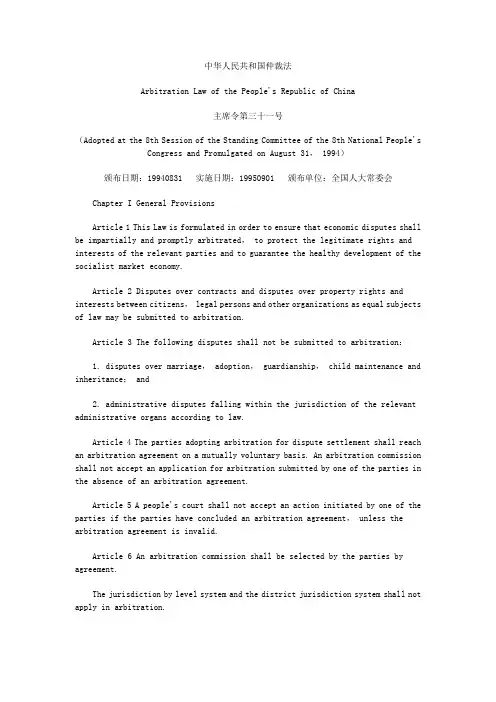
中华人民共和国仲裁法Arbitration Law of the People's Republic of China主席令第三十一号(Adopted at the 8th Session of the Standing Committee of the 8th National People's Congress and Promulgated on August 31, 1994)颁布日期:19940831 实施日期:19950901 颁布单位:全国人大常委会Chapter I General ProvisionsArticle 1 This Law is formulated in order to ensure that economic disputes shall be impartially and promptly arbitrated, to protect the legitimate rights and interests of the relevant parties and to guarantee the healthy development of the socialist market economy.Article 2 Disputes over contracts and disputes over property rights and interests between citizens, legal persons and other organizations as equal subjects of law may be submitted to arbitration.Article 3 The following disputes shall not be submitted to arbitration:1. disputes over marriage, adoption, guardianship, child maintenance and inheritance; and2. administrative disputes falling within the jurisdiction of the relevant administrative organs according to law.Article 4 The parties adopting arbitration for dispute settlement shall reach an arbitration agreement on a mutually voluntary basis. An arbitration commission shall not accept an application for arbitration submitted by one of the parties in the absence of an arbitration agreement.Article 5 A people's court shall not accept an action initiated by one of the parties if the parties have concluded an arbitration agreement, unless the arbitration agreement is invalid.Article 6 An arbitration commission shall be selected by the parties by agreement.The jurisdiction by level system and the district jurisdiction system shall not apply in arbitration.Article 7 Disputes shall be fairly and reasonably settled by arbitration on the basis of facts and in accordance with the relevant provisions of law.Article 8 Arbitration shall be conducted in accordance with the law, independent of any intervention by administrative organs, social organizations or individuals.Article 9 The single ruling system shall be applied in arbitration. The arbitration commission shall not accept any application for arbitration, nor shall a people's court accept any action submitted by the party in respect of the same dispute after an arbitration award has already been given in relation to that matter.If the arbitration award is canceled or its enforcement has been disallowed by a people's court in accordance with the law, the parties may, in accordance with a new arbitration agreement between them in respect of the dispute, re-apply for arbitration or initiate legal proceedings with the people's court.Chapter II Arbitration Commissions and Arbitration AssociationArticle 10 Arbitration commissions may be established in the municipalities directly under the Central Government, in the municipalities where the people's governments of provinces and autonomous regions are located or, if necessary, in other cities divided into districts. Arbitration commissions shall not be established at each level of the administrative divisions.The people's governments of the municipalities and cities specified in the above paragraph shall organize the relevant departments and the Chamber of Commerce for the formation of an arbitration commission.The establishment of an arbitration commission shall be registered with the judicial administrative department of the relevant province, autonomous region or municipalities directly under the Central Government.Article 11 An arbitration commission shall fulfil the following conditions:1. it must have its own name, domicile and Articles of Association;2. it must possess the necessary property;3. it must have its own members; and4. it must have arbitrators for appointment.The articles of association of the an arbitration commission shall be formulated in accordance with this Law.Article 12 An arbitration commission shall comprise a chairman, two to four vice-chairmen and seven to eleven members.The chairman, vice-chairmen and members of an arbitration commission must be persons specialized in law, economic and trade and persons who have actual working experience. The number of specialists in law, economic and trade shall not be less than two-thirds of the members of an arbitration association.Article 13 The arbitration commission shall appoint fair and honest person as its arbitrators.Arbitrators must fulfil one of the following conditions:1. they have been engaged in arbitration work for at least eight years;2. they have worked as a lawyer for at least eight years;3. they have been a judge for at least eight years;4. they are engaged in legal research or legal teaching and in senior positions;and5. they have legal knowledge and are engaged in professional work relating to economics and trade, and in senior positions or of the equivalent professional level.The arbitration commission shall establish a list of arbitrators according to different professionals.Article 14 Arbitration commissions are independent of administrative organs and there are no subordinate relations with any administrative organs nor between the different arbitration commissions.Article 15 The China Arbitration Association is a social organization with the status of a legal person. Arbitration commissions are members of the China Arbitration Association. The Articles of Association of the China Arbitration Association shall be formulated by the national general meeting of the members.The China Arbitration Association is an organization in charge ofself-regulation of the arbitration commissions. It shall conduct supervision over the conduct (any breach of discipline) of the arbitration commissions and their members and arbitrators in accordance with its articles of association.The China Arbitration Association shall formulate Arbitration Rules in accordance with this Law and the Civil Procedure Law.Article 16 An arbitration agreement shall include the arbitration clauses provided in the contract and any other written form of agreement concluded before or after the disputes providing for submission to arbitration.The following contents shall be included in an arbitration agreement:1. the expression of the parties' wish to submit to arbitration;2. the matters to be arbitrated; and3. the Arbitration Commission selected by the parties.Article 17 An arbitration agreement shall be invalid under any of the following circumstances:1. matters agreed upon for arbitration are beyond the scope of arbitration prescribed by law;2. an arbitration agreement concluded by persons without or with limited capacity for civil acts; and3. one party forces the other party to sign an arbitration agreement by means of duress.Article 18 If the arbitration matters or the arbitration commission are not agreed upon by the parties in the arbitration agreement, or, if the relevant provisions are not clear, the parties may supplement the agreement. If the parties fail to agree upon the supplementary agreement, the arbitration agreement shall be invalid.Article 19 An arbitration agreement shall exist independently. Any changes to,rescission, termination or invalidity of the contract shall not affect the validity of the arbitration agreement.An arbitration tribunal has the right to rule on the validity of a contract.Article 20 If the parties object to the validity of the arbitration agreement,they may apply to the arbitration commission for a decision or to a people's court for a ruling. If one of the parties submits to the arbitration commission for a decision, but the other party applies to a people's court for a ruling, the people's court shall give the ruling.If the parties contest the validity of the arbitration agreement, the objection shall be made before the start of the first hearing of the arbitration tribunal.Section 1: Application and Acceptance for ArbitrationArticle 21 The parties applying for arbitration shall fulfil the following conditions:1. they must have an arbitration agreement;2. they must have a specific claim with facts and argument on which the claim is based; and3. the arbitration must be within the jurisdiction of the arbitration commission.Article 22 The party applying for arbitration shall submit to an arbitration commission the arbitration agreement, an application for arbitration and copies thereof.Article 23 An arbitration application shall state clearly the following:1. the name, sex, age, occupation, work unit and address of the party, the name address and legal representative of the legal person or other organization and the name and position of its person-in charge;2. the arbitration claim and the facts and argument on which the claim is based;and3. evidence and the source of evidence, the name and address of the witness (es)。

法律文书翻译一、定义(Definition of legal instrument)Legal instrument is a legal term of art that is used for any formally executed written document.二、分类(Categories)Examples include a certificate, deed, bond, contract, will, legislative act, notarial act, court writ or process, or any law passed by a competent legislative body in municipal (domestic) or international law.三、基本原则(Basic principles)对于法律翻译,译者不宜片面追求形式上的对等,要求译文的词类、语序和句子结构与原文基本保持一致。
法律文件的翻译质量必须用译员对译文的反映程度来衡量。
法律文体的翻译应该遵循奈达提出的“功能对等”翻译原则,即“译文读者对译文的反应等值于原文读者对原文的反应。
1. 公正性(impartiality)是法律专业人员要遵守的最为基本的原则。
2. 准确性( veracity):要求语言使用者对法律概念及所涉及的行为进行严格表达。
3. 合适性(appropriateness):合适性反映翻译的度,主要是对文本原意传达的充分程度。
4. 简洁,精练(conciseness):The simplest, most concise English is the best for legislation:四、用词的基本特点(Features of words )1. 措词精确、避免歧义(precise words)原文:自9月20日起,甲方无权接受任何订单或收据。
法律文本中shall的用法法律文本中shall的用法在英文的法律文本中,法律翻译者经常会碰到情态动词,能否准确翻译,也体现着翻译者的水平高低,尤其是shall在法律文本的翻译中更是频繁,下面就来看一下法律英语中shall的用法。
“shall”怎么译“shall”一般用于法律或半法律文件中,含有“本条款具有法律规定的指令性或强制性之意”。
尤其是在经贸法律文本中,“shall”的译法种类繁多,通常被译为“须”、“应”,有时被译成“应当”,也有时译成“要”、“将”、“可”,还有被译成“必须”,举例如下:1. …the election or recall of chief procurators of people’s procuratorates shall be reported to the chief procurators of the people’s procuratorates at the next higher level for submiss ion to the standing committees of the people’s congresses at the corresponding level for approval.选出或罢免人民检察长,须报上级人民检察院检察长提请该级人民代表大会常务委员会批准。
(宪法)2.One who instigates others to commit a crime shall be punished according to the role he plays in the joint crime. One who instigates a person under the age of eighteen to commit a crime shall be given a heavier punishment.教唆他人犯罪的,应当按照他在共同犯罪中起的作用处罚。
应用文体对比与分析对《Deed of Covenants and Guarantee》英译文的对比赏析——从语篇角度对比分析法律文体翻译1.应用文体1.1应用文体:应用文体是人们在日常工作和社会生活中为处理公私事务时所常用的具有直接使用价值和某种固定程式的各种文章的总称,包括人们用来解决和处理日常工作、学习、生活中的实际事务和问题、有直接应用价值、有约定俗成表达要求、行文简洁的各类文章。
它是人们进行思想交流、情报互通、问题解决和事务处理的实用性工具。
应用文体是一种用途非常广泛的文体,从语言较随便的便条、语言简明的电报等到语言极其规范的公函、合同、协议等,都属于应用文体的范畴。
1.2应用文体的特点:应用文体具有以下几个共同的特点:文体的实用性、内容的真实性、体式的规范性和语言的简明性。
1.2.1文体的实用性:应用文体的实用性是指该类文体在处理公共事务和私人事务中具有实际应用的价值,它包括内容的现实性和时效性。
1.2.2内容的真实性:应用文体内容的真实性是指该类文章的内容必须是以事实为依据,不得虚构和杜撰,文中所涉及的事实和数据材料等都要真实、准确,不得有任何的艺术加工。
1.2.3应用文体的体式规范性是指该类文体因目的不同而需要选用不同的文种和适应不同的格式要求。
1.2.4应用文体语言的简明性是指为了节约时间,提高办事效率,该类文章应该以言明事实、解决问题为主旨,在语言上力求简洁、明确,避免使用一些不切实际的赘述。
1.3应用文体翻译:应用文体翻译包括除文学翻译与权威性学术著作之外的所有文本的翻译,包括科技、经济、法律、旅游、广告、公函以及其他应用性文本(如产品说明书、可行性报告研究、履历、菜谱等)。
1.4应用文体翻译的基本原则:应用文是人们在生产和生活过程中进行交往,相互传递信息的一种文体形式。
应用文体的基本功能是荷载人类社会的规约性信息。
与文学作品翻译相比,应用文体翻译的本质在于“信息”的传递,强调真实性,重视信息传达的效度。